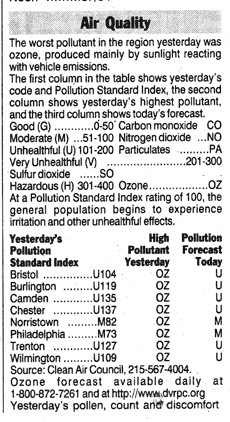|
DOES THE BIG CITY HAVE THE WORST AIR EVERYDAY? by Joe Mikuliak |
||||||
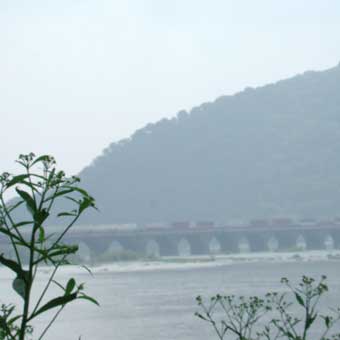 |
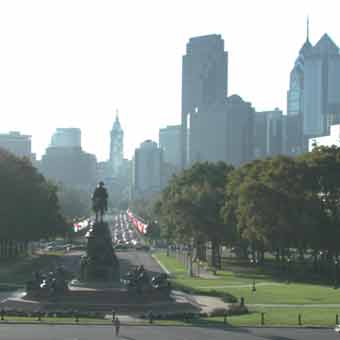 |
|||||
|
||||||
|
FOR A FRESH VIEW OF AIR QUALITY - CITY VS. SUBURBS - READ THE ARTICLE BELOW
Does the big city have the worst air pollution everyday? Well, results from regional air monitoring stations provide a real surprise: air monitoring stations in the Philadelphia suburbs frequently report higher pollution levels than stations in the City of Philadelphia. These air quality measurements aren't a big secret. Everyday our local newspaper, The Philadephia Inquirer, gives a report of the Air Quality on the same page as the weather. .
Our suburban counties each have one or two monitoring stations. Philadelphia has seven. The scientific procedure is exacting and the pollution level recorded is accurate for many miles surrounding the equipment because the wind blows the pollution around. The Air Quality chart reports the highest level reached in each suburban county and the city during the previous day. A pollution level rating over 50 is called "moderate". Over 100 is considered unhealthful. Several different pollutants are tracked and each day the worst one is listed for each county. I have followed these reports. I have noticed a pattern:eight months of the year any county might have the highet pollution level. From June to September, ozone levels in Philadephia are almost always lower than ozone levels in the surrounding suburbs. Ever hear that the farther you live away from Philadelphia, the better the air you breathe? Ever read that you're better off exercising in the suburbs because the air is cleaner? These opinions are wrong. Don't assume the smell of suburban lawns and trees is an indicator that suburban air is cleaner. Ozone is odorless. Other writers have also noticed that suburban air is frequently worst than urban air.The British scientific journal NATURE, had an article in their July 2003 issue entitled "Trees Grow Faster in the City. Ozone Pollution Stunts Suburban Saplings". Their research about air pollution looked at how it affected Mother Nature. Just like my observations, their conclusions were diametricaly opposed to "conventional wisdom". Click here to go to the article in the scientific journal NATURE then please come back to read on. It's time to change the belief that City air is the dirtiest air. 1) go to "Can this be true?" 2) go to "So what?" 3) go to "Why haven't I heard about this before?"
First thing I checked out was the messenger. The statistics are provided to the Philadelphia Inquirer by the Clean Air Council but the CAC said they just compile them from the different reporting agencies. In Philadelphia, it's Air Management Services. The engineer I spoke with there said they use the same equipment and practices as the suburban agencies. He mentioned the "aggressive" maintenance and calibration program run by A.M.S. One of their reporting stations is in the heart of center city at Broad and Lombard Streets. All their work adheres to Federal criteria including exactly how far from the street to place the recorder. Collecting this data is not rocket science or like predicting the weather. He believed in the accuracy of his statistics. Ozone isn't a tailpipe emission but forms from a reaction among car exhaust, warm temperatures, and sunshine. In the air, this ozone does not protect us from the sun's harmful ultraviolet rays like stratospheric ozone does. Exposure to ozone pollution can adversely effect normal lung functions. Breathing (living in) unhealthy levels causes headaches, nausea, chest tightness, and a decreasing ability to do sustained physical activity. Over time ozone makes everyone more susceptible to lung and heart disease. Children consume three times as much air per body weight as adults and three times as much pollution per pound. Parents want their children to be able to play outdoors in the summer. However, this puts them especially at risk. The American Society of Pediatrics and many environmental scientists want ozone declared unhealthful at the .084ppm concentration-70 on the pollution scale instead of 100. . Why haven't I heard about this before? Who is in favor of pollution? People mouth opposition to it but do little about it. And it's not like the weather: we CAN do something about pollution. It's just expensive and involves change. Politicians have noticed this hypocrisy. Too many of our "leaders" are willing to limit environmental protection and our society's health to insure campaign contributions and votes for their own re-election. They make a tax cut the issue, not air pollution. They can get away with this because while 83% of the public feel pollution is bad, only 38% think it affects them. So there is no groundswell of opinion forcing politicians to do anything. Now is not the time to halt the struggle to breathe healthier air. It's true that modern cars pollute less but there are more cars than ever. Every year the miles traveled per vehicle is higher and the average speed at rush hour is slower and stricter regulations get delayed. And the EPA still allows oil refineries to burn their chemical by-products on towers in the open air. And Midwestern power plants still burn the kind of coal that causes extra pollution along the East coast. I could go on. The average MPG of new cars has gotten lower every year since the mid 80's. Fewer and fewer people use Mass Transit. If all this continues, the modest air quality improvements we made during the 1970's will be reversed. More sick people will be the result. Our health and our childrens' health are worth the expense of cleaning up the air we breathe.
Which report helps politicians feel pollution is something they can ignore? Now is an important time to be honest about the region's air quality because important political decisions are being made about whether to control pollution or let it slide. Over 5 million people live in the Philadelphia region. Air in the suburbs is every bit as polluted as in the City. Federal Laws already on the books demand that we attain clean air minimums by the year 2005. Again this year some conservative politicians are working to overturn the law.
City dwellers and suburbanites, we all share very polluted air. Do you vote against politicians who want to overturn clean air standards? How can you support alternatives to more cars and highways? If we do nothing we will breathe dirtier air. More children with Asma and elderly carrying oxygen tanks around will be just two of the consequences Please e-mail me a second opinion on this article. If you agree, please forward to a friend, your representatives in Congress, or the reporter for your local newspaper who writes on pollution a link to this article.
|
||||||||
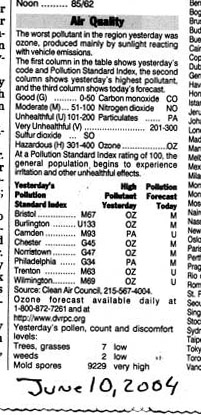
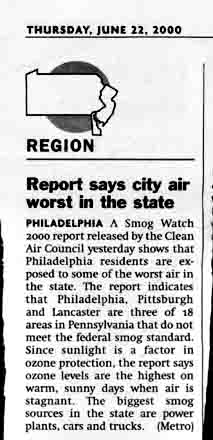
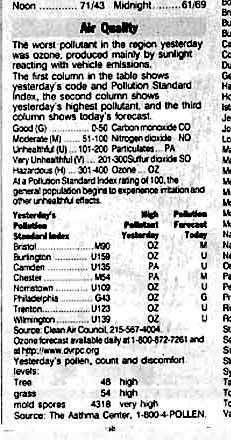 The
pollution report on the left was cut out from the June 7, 2000 Philadelphia
Inquirer. The article on the right was cut out of the June 22 Philadelphia
Metro newspaper.
The
pollution report on the left was cut out from the June 7, 2000 Philadelphia
Inquirer. The article on the right was cut out of the June 22 Philadelphia
Metro newspaper.